The 10 year Anniversary Edition
Max E. Guttman has “no purpose or reason {} for being {} in the department” (The People of New the State of New York VS. Max E. Guttman, 2008)
Background:
Contesting Admission is one extended metaphor that seeks to capture the events unfolding in 2008 within the Binghamton University English Department immediately following the Graduate’s School decision not to admit this writer into the English Masters program. The paper was written while I descended into a psychotic episode, isolated, and very disconnected from reality. Contesting Admission has been edited from its original version after my recovery from Schizophrenia for the benefit of the reader. The edited version allows the reader to evaluate the clinical picture & my mental status as the story progresses.
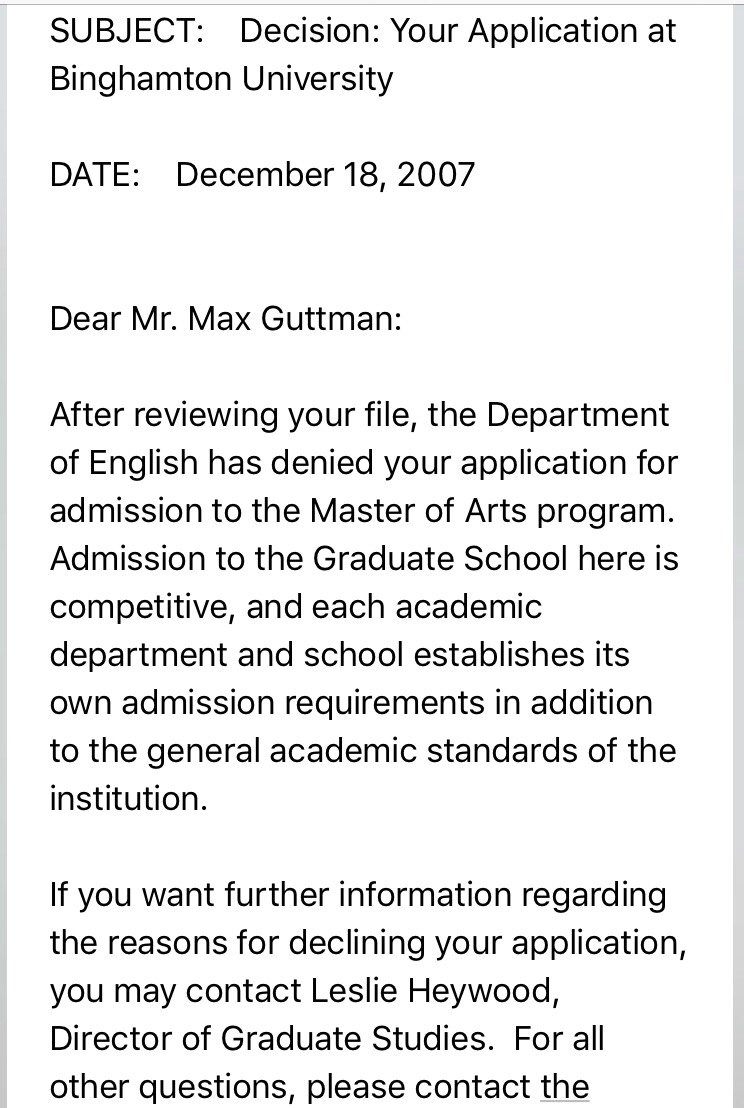
The paper is written in the style of Michel Foucault and cites incidents in my life that I quote with primary documents (e.g court orders, lists from the B.U English department, & publications in the community which followed my story at the time). The paper was my attempt to make sense of the world around me as it became more and more distorted and irrational.
The progression of my symptoms took place over a six month period after the admission decision. Contesting Admission ultimately, despite its aim, achieved its intent. I identified a “concern” in the Humanities. While I initially set out to identify what it was that blocked my admission to the department, a tremendous concern was eventually identified, the state of my mental status, which, ultimately lead to my admission to the hospital.
Contesting Admission began with a discussion of history versus the future of language, or, as titled in article, “Historical Cultural Cosign Scientific Perspective(s)”, which said, “I obedient investigations at the academy at SUNY Binghamton”. Here, I am writing about the review of my application for study and trying to make sense of how the decision to not admit this writer into the graduate program at B.U was a departure from the norm from other candidates in the past. Noteworthy, and clinically significant is the language I used, “obedient”, gesturing to a superiority of myself over other candidates who have applied, and generally, assertion of myself over the entire process of admission.
As the paper unfolds, “Transforming Sign Acheology” or as translated into English, and what I was trying to say at the time, is how a decision to “Admit” can be “Declined” by the department. At that time, in early Spring, the department had implemented a policy not to allow me into specific areas of the department, or, as referenced in the paper, “to lay down the threshold it must not cross”, gesturing to the line between safe for me to walk through without getting arrested. It is clinically significant, to note that I referred to myself as “it”, as here, in early Spring, I was already becoming both self-referential, and experiencing depersonalization. Later I will quote a line from my summons for my court appearance, “The People of New York versus Max E. Guttman” and compare it to “Transnational English Terorism”, which can be understood as a very black and white “everyone is against me” bend of viewing the world.
In “Rhetorical Sciences”, I begin talking about Madness and “day to day observations” of my everyday life in Binghamton. Which, again, signals to irony of the state of my mental status, and the very fact I was being observed by the department on the level of behavior and as stated in the email from the Dean, “assessed for safety to continue as a student”. I go on to talk about hygiene, which, clearly, at that time, was an issue, also noted by the Dean of students. However, the issue I discussed in the original paper was how hygiene was used as something to hinder me instead of my own deficit in self-care, which, at that point, was a clinically significant issue and again signals to where my mental status was at that time.
In the passages “Empire” through the “Second American Revolution”, was the point in time my friend was writing a paper on my arrest for loitering. While it is obvious I understood this arrest to apart of my own political revolution, and, and “illness in the humanities”, the illness was definitely my own, and not of the humanities in Binghamton. The passage “Diagnosing Technologies of Crystallization”, in which I was summarizing my work, I was definately, diagnosable myself. This is where I discovered the word, “meta-power”, a new word I thought in language, but that was in fact when the voices truly became disturbing, and spoke to me, a departure far enough from reality to think anything is happening, but what was really happening, was my imminent hospitalization in which my illness would be diagnosed by a team of clinicians at Binghamton General Hospital.
Ultimately, this paper was in fact written from the point of onset to hospitalization. I showed this paper to very few people at the time. But there were a few people I did share this with, who, commented very little on its meaning and intent. The paper was intended to overturn the admission. I made that clear to those I discussed the paper with and again, heard very little feedback. Later posts will discuss what to do when someone you care about is writing in this manner and brings it your attention. It may be critical in your friend getting the help he or she needs. While writing can be therapeutic, it very much depends as always, on the authors intent and belief on what the writing will set out to achieve or its purpose.
As a therapist, I read the writing of my patients and evaluate their mental status based on why the patient is bringing the writing to my attention and other evaluative methods. This criteria will be discussed in future topics as well to help you & others in crisis.
Meta-power is a word that I use often during the paper. It signifies the power of language and those who wield it (i.e Dr. Heywood the English department chair) to make decisions that change the world, from globalization down to day to operations in English departments. Throughout my last days in the community, I wrote day and night for months trying to identify the root of power that discontinued my path to graduate school in English and ultimately, the mysteries embedded within language.

Abstract:
Martin Jay’s diagnosis of Social-Epistemic discourses engaging amid “ this cluster of uses, the aesthetic {…} variously identified with irrationality, illusion, fantasy, myth, sensual seduction, the imposition of will, and inhumane indifference to ethical, religious, or cognitive considerations” (1992) invariably signifies a tyranny in the Humanities. American scholarship roots conceptual indoctrination in emancipation; I decree that the English system of signification arranges regency period(s) hazardously and willfully in the term I dispense: (meta-power). I simplify judiciously unfamiliar signs forming during the Regency period to pleasure the English department by both registering & apprehending departmental eruptions as meaning “that must be resisted and defended at all costs” (1992). Marshalling uses of science and cultural studies, I organize pragmatist philosophy concretizing the birth of the United States to the age of Globalization. Welcoming multidimensional conditions- undeniably, this diagnosis of meta-power passes through transnational lens. In order to ground scholarship in significant research, I principle work at SUNY Binghamton indulging the English department. In abstract, I judge significant pedagogical applications & practices to position (roots) of power.
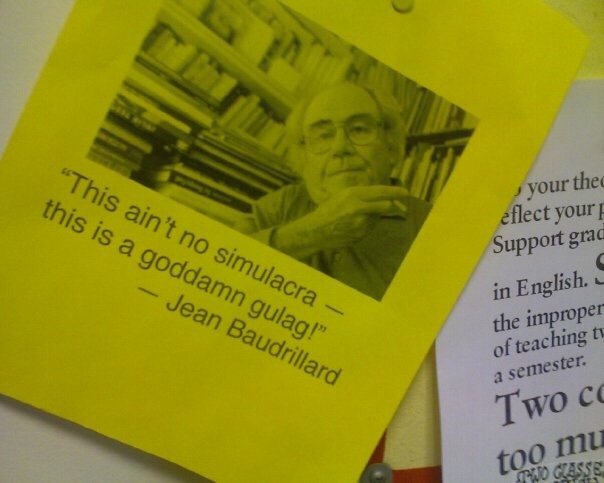 <
<
Historical Cultural & Scientific Perspectives:
My rendering of Foucault in this essay violently originates amid “ a desire to view typically theoretical activities- interpretation, categorization, analysis– as inherently political” (Moussa & Scapp, 1996) in Madness and Civilization, Discipline and Punish, and The History of Sexuality to be “all ‘political’ works” (Moussa & Scapp, 1996).
Presently, my work as a student concerning literary theory and criticism is incomplete as an English Major. The wholesale neglect of my status by the department “doubtless important for the constitution of new knowledge(s) [saviors]” (Foucault M. , The Essential Foucault, 1994) has been clumsy by those who rejected my application for further study in the Humanities. In order to claim counter-discourse, I intend to dismantle Foucault’s scholarship to highlight political suspicions within the English department.
I grant full meaning to a new theory: (meta-power). My diagnosis outwardly reveals transnational transformations within the English system of signification. For language to “grow ad infinitum” (Rescher, The Limits of Science, 1999) So far as to say, there must be a premise to inquire into he root of power. In immediate response, my diagnosis supplements critical theory with “no absolute, state-of-the-art, independent way” (Rescher, The Limits of Science, 1999) or any authorial voice to suppress meaning-making in the Humanities.
The lens I use to examine this phenomenon rests with the Regency Acts in England. Consider this critique of isomorphic discourse circulating the American Revolution. Dislodging departmental trends and investigations to calling upon a new ritual of right “as an especially dense transfer point for relations of power” (Focault, 1972) points to this new theory of meta-power.
Unequivocally harnessing meta-power as an essential “strategic model” (Focault, 1972) overtly generalizes transformative pathways in the humanities. My application of theory approaches exhaustive pedagogical practices dominating in the English department. Accordingly, I obedient investigations at the academy at SUNY Binghamton as an immediate function of meta-power.
Transforming Sign Archeology:
The root of the very “the fabric which is the product of the art of statesmanship” defining “kingship: the statesman” (Plato, 1997) interprets an organic discourse suggesting that the various dimensions of knowledge (savoir), among many others, is a paradigm to surgery archeological structures existing in language necessitating “Grammar and meaning {} be maintained in such a way that the representation of the hallucination in reality….does not seem like the transition into a new language, with an altered meaning” (Foucault M. , Madness and Civilization, 1965) as a scandalous affair functioning in the eighteenth century “ as the object par excellence of all measures of confinement” (Foucault M. , Madness and Civilization, 1965) unreasonably ignored during the realm of King George III.
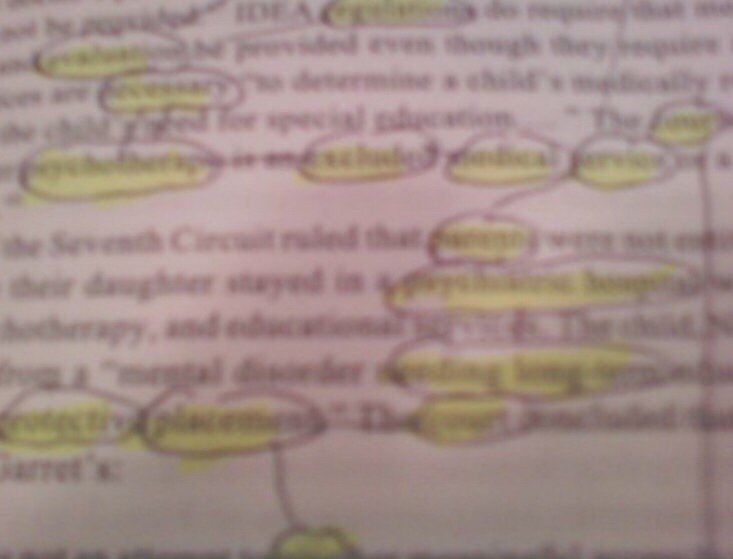
The great caesura between subject and object during madness as an undifferentiated experience. I must suggest the transformation of the archeology of signs in the English department as the product of meta-power. The rhetorical hallucination present in our generalized fields of study reveals the root of power “ capable of forming meaning on its own accord” (Foucault M. , The Archeology of Knowledge & The Discourse on Language, 1972) . The circulation of discourse I disassociate from a simple valorization of myth dawns on the prohibition of revolution; I make visible the meticulous channels of meta-power to be a scandalous report of the transformation at work in the English department.
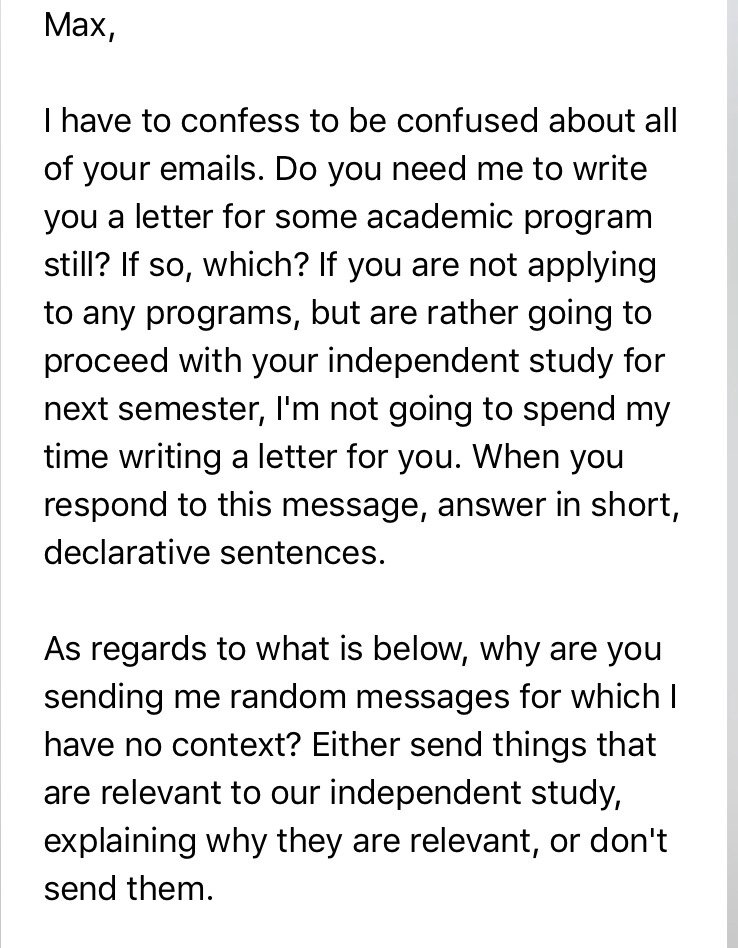
In the Eighteenth century meta-power is present in new texts “to be the very web of the text” (Foucault M. , The Archeology of Knowledge & The Discourse on Language, 1972) revealing a paradox. In this regard, the the paradox occurs during Glorious Revolution. It even extends into a more elaborate schema of channels; my diagnosis of this phenomenon suggests admitting new knowledge “less charged with determinations” (Foucault M. , The Archeology of Knowledge & The Discourse on Language, 1972) and this student to graduate school. Surrounding the root of power in the English department revolves the ongoing politics of educational settings. I suggest the possibility of exercising some ethics in this University.

The interconnections & recruitment of new rhetorical theory and students signals a problem. The signs are clear & I will make them visible here in this discussion are supplied from the English department at SUNY Binghamton; I organize the context for presenting the signs in order to highlight the pedagogical transformative agency “now, the function of enunciative analysis” (Foucault M. , The Archeology of Knowledge & The Discourse on Language, 1972) to surround the list.
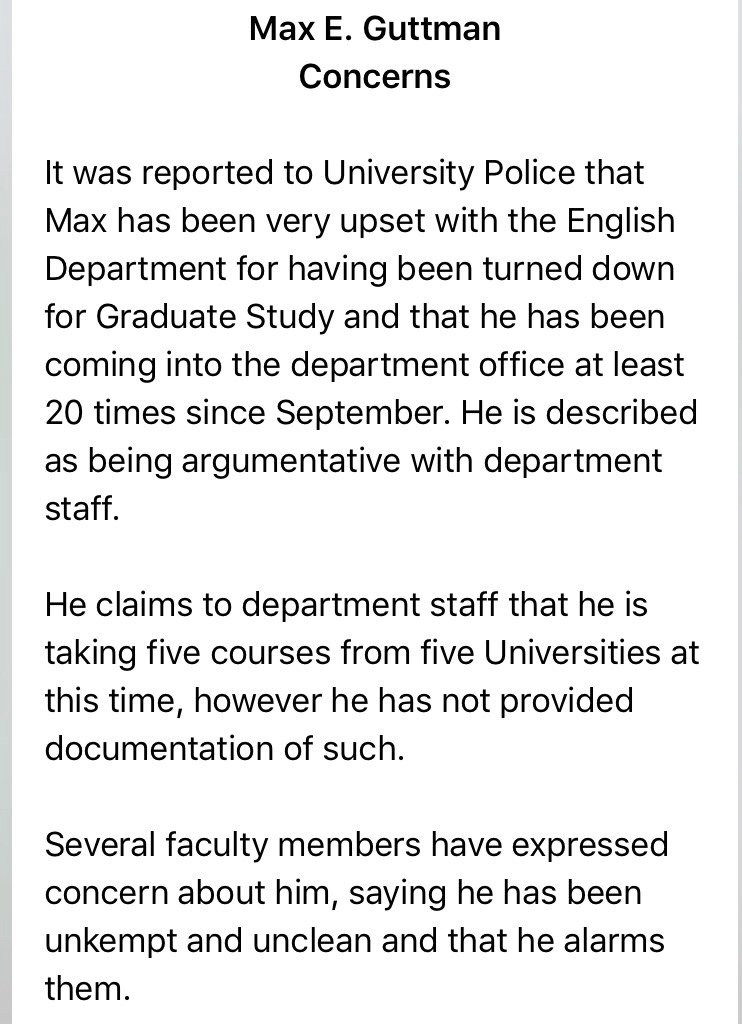
The department list was more than deliberate; I point towards the final item to “determine if he is safe to continue as a student” (Binghamton, 2008) to open a space for this self-reflexive research report underwriting my recent scholarship. I believe there are significant implications to this students given the safety assessment administered to this student by the English department “to lay down the threshold it must not cross” (Foucault M. , The Archeology of Knowledge & The Discourse on Language, 1972) Therefore the list & charge of loitering is nothing more than a shift in the contemporary paradigm of departmental politics.
The juridical powers present in Broome County Court system signal the departmental crisis necessitating my arrest is a direct criticism from Professor Heywood suggesting that I have “no purpose” (The People of New the State of New York VS. Max E. Guttman, 2008) to practice discourses in the Humanities.
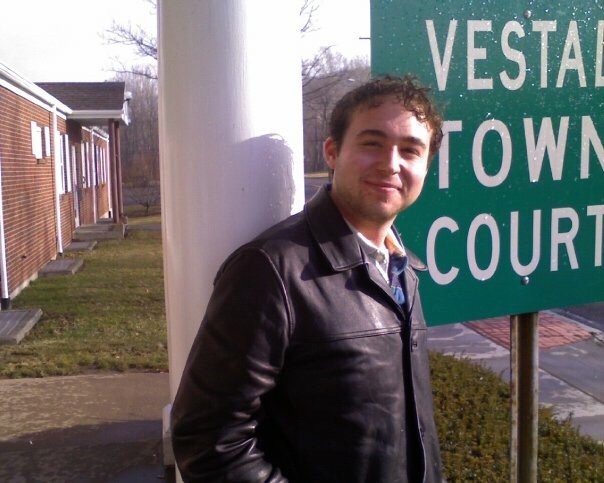
The future of my pedagogy and practice at B.U rests in the vast web meta-power; I suggest Dr. Heywood is an academic hemorrhage “on theoretical phases” (Foucault M. , The Archeology of Knowledge & The Discourse on Language, 1972) in the larger realm of higher education. Simply, implying an individual does not have a purpose in the Humanities is a local act of genocide. My diagnosis for the Humanities at this juncture is to limit acts of genocide, however local.
I diagnose the archeology present in the legal scripture outlining The People of New York State VS Max E. Guttman to uncover the root of power in English departmental schemas; the diagnosis I take issue with is Dr. Heywood‘s decree that I have “no purpose or reason {} for being {} in the department” (The People of New the State of New York VS. Max E. Guttman, 2008)
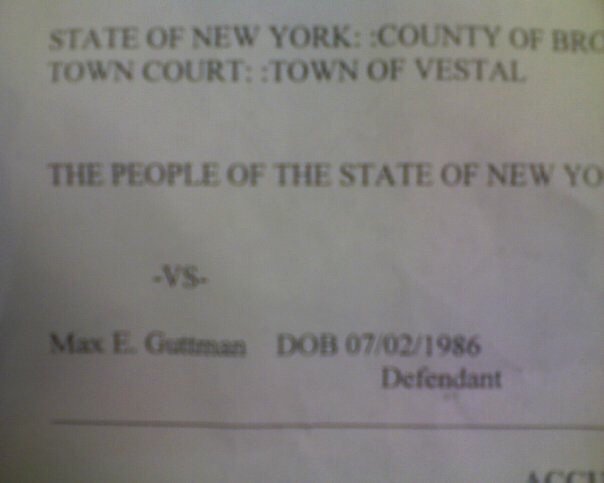 <
<
Postmodern Ethical Maturation:
The department’s “uncertainty” to arrange “a new ethic of being” (Pallladino, 2002) pitch to postmodernism; my diagnosis to the ethical maturation within the English department to be a precept to a new ethics of being & behavior by academic gatekeepers.
Foucault offers the terms, power, knowledge, transformation into the very “back and forth” (Focault, 1972) negotiations between patients and highly specialized discourses. My response to Deleuze, Latour, and Rabinow’s suggests “account of the fate of ‘knowledge’ is as least inconsistent” (Palladino, 2002)
Outmoded predicaments rupturing archeological structures “as medical-case history” (Foucault M. , The Archeology of Knowledge & The Discourse on Language, 1972) to follow the Humanities “not physical levels but levels of consideration” (Rescher, 1999) rejected my admission to the department.
My career at SUNY Binghamton suggests “this possibility for mutual understanding and agreement” to prevent even “‘the ordinary use of the English language’” (Reisch, 2005)is admission into the English graduate program.
I am the first student to be arrested for loitering by the office of rhetoric. I suggest this caesura is a split in the genesis of knowledge to this date. The items I mobilize to familiarize the reader with this warehouse of unknown is “the reference to the interiority of intention” (Foucault M. , The Archeology of Knowledge & The Discourse on Language, 1972) to supplant existing rhetorical theory to date.
Rhetorical Sciences:
My health status to continue on as a student and proceed into graduate study speaks to the utterances within the Medical Dictionary in 1743. Robert James symbolizes the evolution of madness and my medical problems in the dictionary James’s organizes for Manic-Depressive disorder. My work suggests scientists “find from experiments and day-day observations that one and the other must have the same cause” reify medical science’s “new ethical perception” (Foucault M. , 1965) as madness and not the problems propagated by the root of power in the English department.
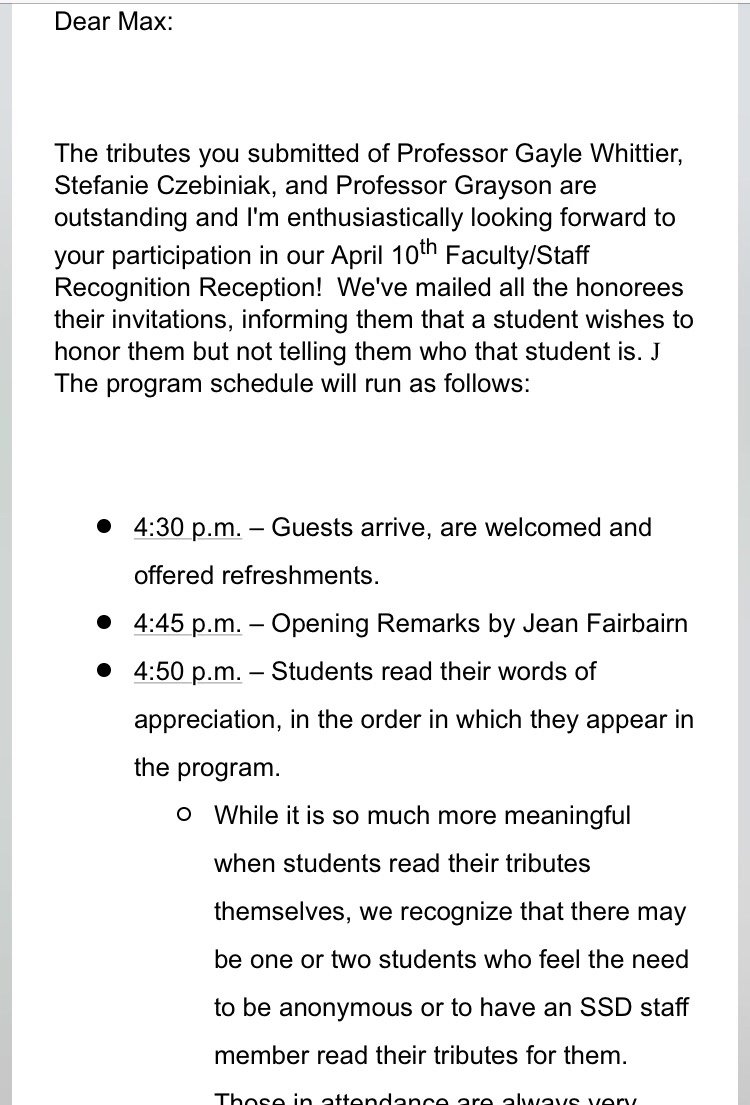
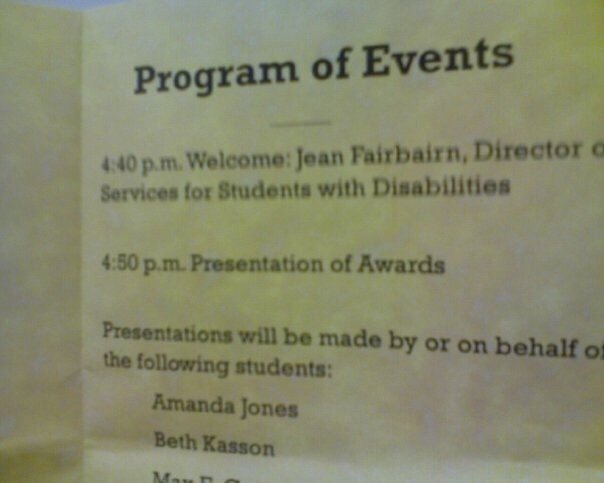 ]
]
My hypothesis is that madness and concern for this student to be nothing more than the subjectivity of broken language. Linguistic systems identify madness “more frequent in England than anywhere else, ‘of the wealth universally enjoyed” (Foucault M. , Madness and Civilization, 1965).
The regent, King George IV revolutionizes parliament in the the eighteenth century through uses of meta-power. I term the realm of King George IV to service admission of this new form of power. In this regard, I seek to underwrite power to profit alternative schemas of pedagogy “which nevertheless they never seek to modify” (Foucault M. , The Archeology of Knowledge & The Discourse on Language) my admission to graduate school.
The canon I premise which claims that medicine as “programme of hygiene as a regime of health for populations” (Foucalt, 1972-1977) remarks upon both invisible and visible acts to discontinue the studies of the student.


The Second American Revolution during the realm of George IV dismantles the structure of empire “in an auto-pathologization” (Foucault M. , Abnormal, 1974-1975). I calculate this process to be similar to “‘the knock heard ‘round Harpur’” (Mpintos, 2008) triggering mg my loitering arrest as the real illness in the Humanities at SUNY Binghamton.
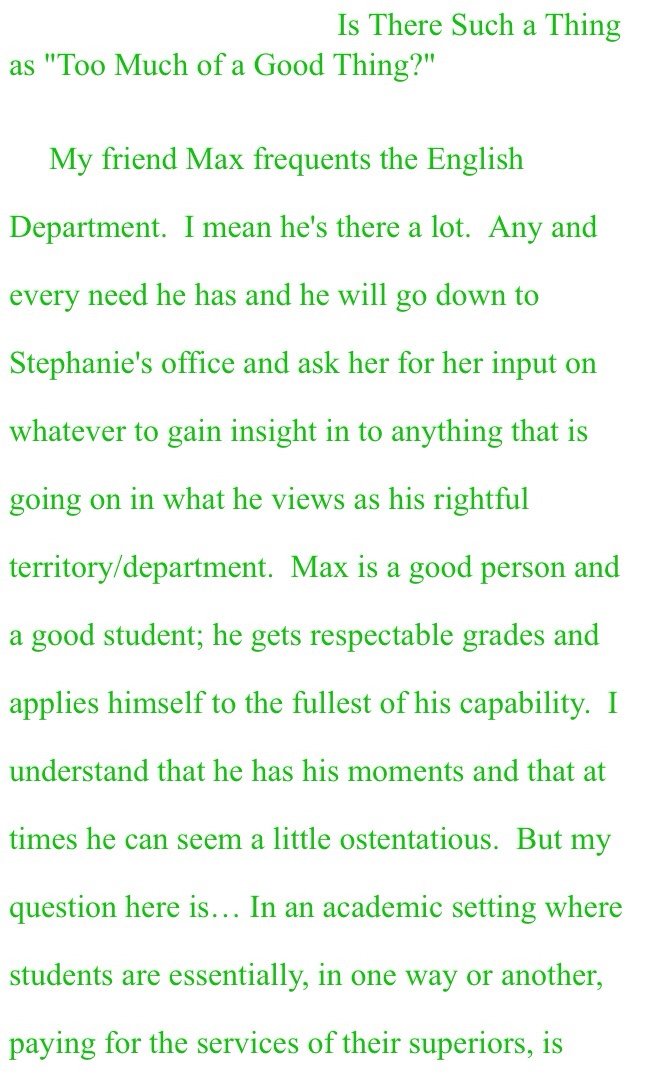

During the age of Globalization; at the very least in the age of transnationalism, a deeper understanding of the larger social and political implications is re-thinking “ the theory of monarchy that trust in the king was a necessity” (Foucalt, 1972-1977) and the department chair to make admission decisions.
Clearly, while two competing transformations arrange linguistic evolution, the problem of adjusting an “absolutely good sovereign” (Foucalt, 1972-1977) is not the case in the ethics of Dr. Heywood; my diagnosis suggests monuments activity & transformation surrounding meta-power in the English department to be a competing transformation and graduation into higher education.
I suggest transformation is at the very root of all evolution and the root of all power; I isolate structures in the history of rhetorical theory to create the conditions in the department and all activities to this date surrounding my admission to graduate school
Transnational English Globalization & Terrorism:
My research suggests a multiplicity of power. I simplify macro and micro transnational directions in American studies. I think that “Living in this world, it is difficult to ignore the brutal acts of what Robert Burns referred to as “man’s inhumanity to man” (Einhorn, 2006) to evidence this phenomenon has always existed everywhere man walks.
My suggestion is that there is an obvious adversarial argument which explains surrounding terrorism in the department; I pass through Einhorn in her suggestion that “ the signs have always been with us, from the brutality of ancient Rome to the modern day holocausts of Nazi Germany, Southeast Asia, Rwanda and Bosnia; from the tortures committed in the name of political or religious ideals to the all-too-common tales” (Einhorn, 2006) to elaborate on the natural tactical connections meta-power to condemn linguistic expression.
My point is the convenient formula Einhorn suggests in WOULD YOU FORGIVE operates to overlook mistakes overlook “minor changes {} that {} have not been listed, and in numbering the courses in chronological to be maintained. All reasonable care has been taken in compiling the information but time did not permit proofs to be checked by the departments” (Barlow, 1968) during my rejection from the English graduate school. I suggest forgiveness provides once forbidden admission to exit the domain of confinement from scholarship.
The departmental charge of loitering is nothing more than the back and forth dialogues insistent upon deferral of this writers graduate study marking stress in meaning making. The ruse of departmental terrorism puts into “a whole new meaning” the act of Einhorn’s “ totalitarianism in World War II ( as the Polish critic Jan Kott has done in his book, Shakespeare Our Contemporary)” (Einhorn, 2006) generalizing scholarship & pedagogical theory in the English department to capture the attention of Binghamton University Free Press.
I suggest the English department mobilizes a much larger philosophical dilemma as seen in the inhuman acts of King George IV. The political social camp of King George III complains “about his reoccurring presence in the building” (Mpintos, 2008) & this student in the office of rhetoric.
Unmistakably, being and transformation are bound in a paradox. I service a new ethics to be postmodern maturation. In the context of archeological transformation “one seeks to make oneself as adequate as possible” (Foucault, 1977) and continue on as a student in the university. The multiplicity of power stopping another revolution & transformation into graduate studies implies a gross split between the department’s chair and the needs of this student.
Diagnosing Technologies of Crystallization:
So far that I am aware, very little work has been done on this subject. I have not undertaken a survey of the literature, partly because I do not know how to go about it. To be sure, there is one quite obvious place to look- the Oxford English Dictionary” (Frankfurt, 2005)
My diagnosis of the problem in the English department is the continuing denial of my ongoing presence in the university and need for further study; in this vein, conditions for future linguistic genesis and graduate study gesture towards the English Dictionary’s definition of loitering; my analysis examines the philosophy of language surrounding the use of cultural studies to affix meaning to dismiss social qualities in trans-historical and transnational works in the Humanities.
I insist the Humanities is actively resisting the theoretical significance of my scholarship. The department requires an urgent critique of the consistent and persistent rationale for overshadowing King George III’s tenure; research indicates the historical construction of rhetorical evolution is a powerful device to package accumulating antithetical structures and evidence contestation of admission to graduate school.
In this vein the appearance of various concerns emerging from specific forms of meta-power are clearly at work. My work disentangles the complexities of meta-power infiltrating the Regency act; I provide historical scholarship to call upon the archeological records “individuals health, and possibly life, are at risk” (Foucault M. , The Care Of The Self- The History of Sexuality Volume III , 1986) to parliament and the office of rhetoric. I term the chartering of science to account for phenomena specialists suggest exist outside the English system of signification. I term concern as the precept for exclusion and rejection from further scholarship in the English language.
In this vein, I must call upon the Humanities to recognize the presence of an episteme to supplement the existing uses of science and cultural studies in a clearly endangered state of existence.

Until freedom prevails & politics no longer occupies uses of science in linguistic paradigms of American studies the B.U English department will continue to require an urgent critique and further attention “the final cause-which is continuation of the generations- is pursued through a material cause and organic arrangement” (Foucault M. , The Care Of The Self- The History of Sexuality Volume III , 1986) so this student can enter the graduate school program.
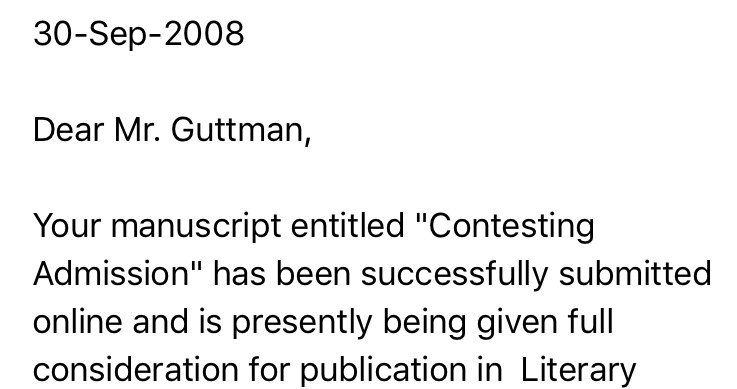
[contact-form][contact-field label=”Name” type=”name” required=”1″ /][contact-field label=”Email” type=”email” required=”1″ /][contact-field label=”Website” type=”url” /][contact-field label=”Comment” type=”textarea” required=”1″ /][/contact-form]
Works Cited:
Berlin, J. A. (2003). Rhetorics, Poetics, and Cultures: Refiguring College English Studies. Indiana: Parlor Press.
Binghamton, T. E. (2008). Max E. Guttman Concerns. Binghamton: SUNY Binghamton.
Derrida, J. (1966). Structure, Sign, and Play in the Discourse of the Human Sciences. In C. K. Anderson, Criticism: Major Statements (pp. 493-510). Boston/ New York: Emeritus, California State University, Northridge.
Einhorn, L. (2006). Forgivesness and Child Abuse: Would You Forgive? Bandon: Robert D. Reed Publishers.
Focault, M. (1972). The History of Sexuality vol one. New York: Random House.
Foucalt, M. (1972-1977). Power/Knowledge. New York: Pantheon Books.
Foucault. (1977). The Care of the Self-The History of Sexuality Volume Three. New York: Random House.
Foucault, M. (1965). Aspects of Madness. In M. Foucault, Madness and Civilization (pp. 117-157). New York: Vintage Books- A Division of Random House .
Foucault, M. (1977). Clarifications on the Question of Power. In S. Lotringer, Focualt Live (pp. 255- 263). New York: Lotringer.
Foucault, M. (1977). Discpline and Punish. New York: Vintage Books.
Foucault, M. (1965). Madness and Civilization. New York: Vintage Books- A Division of Random House.
Foucault, M. (1975, October 3). Radioscopy of Michel Foucault. (J. Chancel, Interviewer)
Foucault, M. (1994). The Essential Foucault. New York-London: The New Press.
Frankfurt, H. G. (2005). On Bullshit. Princeton: Princeton University Press.
Moussa, M., & Scapp, R. (1996). The Practical theorizing of Michel Foucault: Politics and Counter-Discourse. Cultural Critique , 87-112.
Mpintos, M. D. (2008, May 8). The Student Protest That Went Unprotested. Binghamton University Free Press , p. 14.
Palladino, P. (2002). Between Knowledge and Practice: One Medical Professionals, Patients, and the Making of Genetics of Cancer. Social Studies of Science , 137-165.
Pallladino, P. (2002). On Medical Professionals, Patients, and the Making of Genetics of Cancer. Social Studies of Science , 137-165.
Plato. (1997). Statesman. In J. M. Cooper, Plato Complete Works (pp. 506-556). Indianapolis/Cambridge: Hackett Publishing Company.
Roth, M. S. (1981). Foucault’s ” History of the Present”. History and Theory , 32-46.
The People of New the State of New York VS. Max E. Guttman (Vestal Town Court March 18, 2008).
Max E. Guttman is the owner of Mindful Living LCSW, PLLC, a private mental health practice in Yonkers, New York.
- Max E. Guttman








5 thoughts on “TRANSFORMATIVE PATHWAYS FOR INDENTIFYING CONCERNS IN THE HUMANITIES: CONTESTING ADMISSION”
Pingback: A Story of First Episode Psychosis: From Symptom Activation to Hospitalization – Recovery Now❗️
Pingback: The Criminalization of Mental Illness | Recovery Now❗️
Pingback: Addressing Symptoms: Extended Metaphors, Ideas-of-Reference | Recovery Now❗️
Pingback: The Strategist | Recovery Now❗️
Pingback: How King George III Transformed Mental Health Law | Psychreg